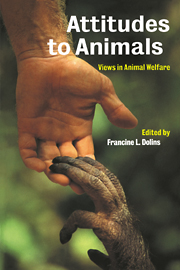Book contents
- Frontmatter
- Contents
- List of contributors
- Acknowledgements
- Part I Attitudes to animals
- Part II Animal awareness
- 4 The problem of animal subjectivity and its consequences for the scientific measurement of animal suffering
- 5 Environmental enrichment and impoverishment: neurophysiological effects
- 6 The behavioural requirements of farm animals for psychological well-being and survival
- 7 Personality and the happiness of the chimpanzee
- 8 Primate cognition: evidence for the ethical treatment of primates
- Part III Animal welfare
- Part IV Research and education
- Part V Epilogue: the future of wild animals
- Index
8 - Primate cognition: evidence for the ethical treatment of primates
Published online by Cambridge University Press: 16 November 2009
- Frontmatter
- Contents
- List of contributors
- Acknowledgements
- Part I Attitudes to animals
- Part II Animal awareness
- 4 The problem of animal subjectivity and its consequences for the scientific measurement of animal suffering
- 5 Environmental enrichment and impoverishment: neurophysiological effects
- 6 The behavioural requirements of farm animals for psychological well-being and survival
- 7 Personality and the happiness of the chimpanzee
- 8 Primate cognition: evidence for the ethical treatment of primates
- Part III Animal welfare
- Part IV Research and education
- Part V Epilogue: the future of wild animals
- Index
Summary
Jakob Bronowski, in The Ascent of Man (1973), considered it not at all surprising that Galileo – as a man of very great imagination – was prepared to recant scientific beliefs that he knew to be right, at the mere threat of torture on the rack: ‘his imagination could do the rest’. The implication is that greater ability to imagine personal future events will confer greater scope for mental torment and suffering. (On the same lines, a mountaineer once facetiously remarked that the most important quality for an iceclimber was a complete lack of imagination!) Many people would agree with this diagnosis, when applied to human beings. Yet animal welfare is normally restricted to the demands of the here-and-now. ‘Suffering’ is viewed as a matter of current deprivation (for instance, of sleep, water, or affiliative social interactions) or current imposition (for instance, of pain, noise, social overload, or other upsetting circumstances). If all non-humans lack the ability to imagine a specific, personal future, and live only in the present, this approach is correct. But can we be sure?
Given the practical difficulties of studying animal imagination, a difficult choice of ‘null hypothesis’ immediately confronts us. Should we assume, until good evidence is provided otherwise, that only humans can ever suffer in anticipation of imagined future events? This would be consistent with the Judaic–Christian tradition of reserving all higher cognitive function for ourselves, and allow a robust, easily assessed welfare standard to be applied even-handedly to all animals.
- Type
- Chapter
- Information
- Attitudes to AnimalsViews in Animal Welfare, pp. 114 - 126Publisher: Cambridge University PressPrint publication year: 1999
- 5
- Cited by



